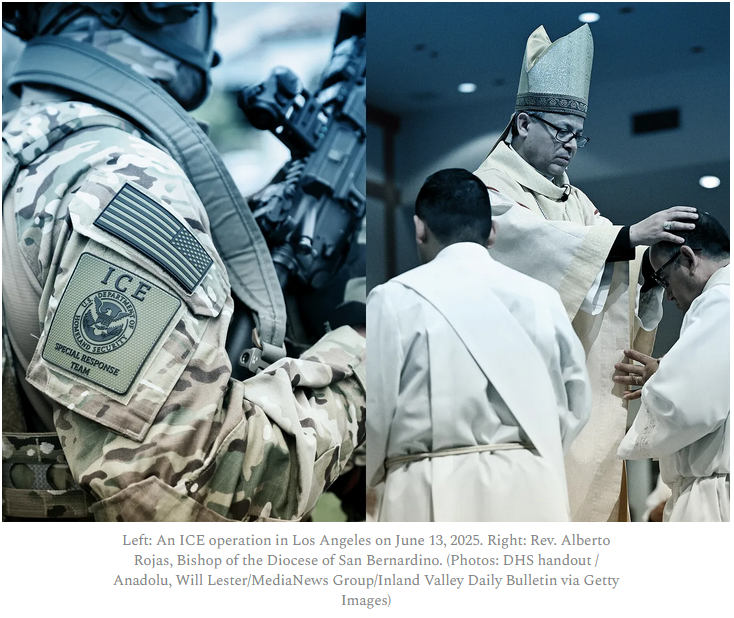Church Leaders Denounce Deportations. American Christians are showing increasing discomfort with Trump’s signature policy.
by William Kristol, THEBULWARK

Donald Trump rode the issue of immigration to the presidency twice. What that issue primarily meant to Trump and his supporters, in both 2016 and 2024, was fixing a porous southern border, and preventing the kinds of crimes allegedly committed by immigrants who had come across that border.
But the center of gravity of the immigration issue has changed. It’s now Trump’s mass-deportation agenda. And it’s becoming pretty clear that the politics of mass deportation could turn out to be very different from the politics of controlling the border. Could the spectacle of a mass-deportation campaign become a political vulnerability for Trump?
I think so. But what’s newly interesting is the possibility that mass deportation could be creating particular problems for Trump among churchgoing Catholics and Protestants, groups that have disproportionately supported him in the past. There appears to be growing unease in the churches with Trump’s signature policy. We don’t know yet how widespread the discomfort is. We certainly don’t know how widespread it could become. And we don’t know whether discomfort will turn into active disapproval. But we may have seen a couple of leading indicators this week.
In California, Bishop Alberto Rojas leads more than 1.5 million Catholics in the Diocese of San Bernardino, east of Los Angeles.1 It’s the nation’s sixth-largest Catholic diocese. And this week, Bishop Rojas took the extraordinary step of formally excusing parishioners in his diocese from the obligation of attending mass weekly, because of the possibility immigration officers would seize people coming to or from church.
“There is a real fear gripping many in our parish communities that if they venture out into any kind of public setting they will be arrested by immigration officers,” Rojas explained.
Sadly, that includes attending Mass. The recent apprehension of individuals at two of our Catholic parishes has only intensified that fear. I want our immigrant communities to know that their Church stands with them and walks with them through this trying time.Now it’s fair to point out that San Bernardino is more heavily Hispanic than most areas, and that Rojas’s action is for now an outlier, and may remain so. (One other bishop, in Nashville, has taken a similar step.) On the other hand, it’s still a striking action, and one wonders what ripple effects it will have in the Church and among churchgoers. Especially because Pope Leo XIV—who is, after all, the first American pope—has also indicated that he is sympathetic to the plight of immigrants here in the United States and is critical of mass-deportation efforts. (For more on this, read Joe Perticone’s excellent piece on the collision course that the Church and Trump seem to be on.)
Will this ultimately affect the voting of American Catholics, who supported Trump by 14 points over Kamala Harris in 2024, a marked increase from Trump’s 5-point margin over Biden in 2020? It could. Trump doesn’t seem at all inclined to let up on his mass-deportation efforts. Nor is the Church likely to become less critical of those efforts over the next year. How many masses will there be against mass deportation?
At the same time, the administration appears to be trying to marry its deportation campaign to the teachings of the Church—though in typically clumsy fashion. The Department of Homeland Security tried to enlist the Bible in its efforts, tweeting out a video with grainy footage of immigration agents on boats and helicopters carrying out their missions under cover of darkness, while featuring a voiceover of a Border Patrol agent:
There’s a Bible verse I think about sometimes. Many times. It goes, “Then I heard the voice of the Lord saying, ‘Whom shall I send? And who will go for us?’ And I said, ‘Here am I. Send me.’”As Austin, Texas pastor Zach Lambert pointed out, in a much-retweeted post, that Bible verse is Isaiah 6:8—and the context in Isaiah cuts against DHS’s message.
“Here am I, send me” was the prophet Isaiah’s response after being called by God to deliver a message to the people of Israel. And what was that message? . . . “Your leaders are rebels, the companions of thieves. All of them love bribes and demand payoffs, but they refuse to defend the cause of orphans or fight for the rights of widows.” Isaiah 1:23Pastor Lambert also pointed to Isaiah 10:1–3:
Woe to those who make unjust laws, to those who issue oppressive decrees, to deprive the poor of their rights and withhold justice from the oppressed of my people, making widows their prey and robbing the fatherless.Pastor Lambert’s post, and others in the same vein, have gotten a lot of pickup and support on social media. Maybe the flacks at DHS should leave the prophet Isaiah alone, and go about their sordid business without seeking Biblical blessing? But they’ll presumably continue to claim the moral high ground for their efforts. Could that lead to a further backlash?
In any case, the reactions of Bishop Rojas and Pastor Lambert to mass deportations seem notable to me. Are they important leading indicators of resistance to Trump in their communities? I wouldn’t claim to know. But sometimes politics, like the good Lord, moves in mysterious ways.
.
.




Be the first to comment